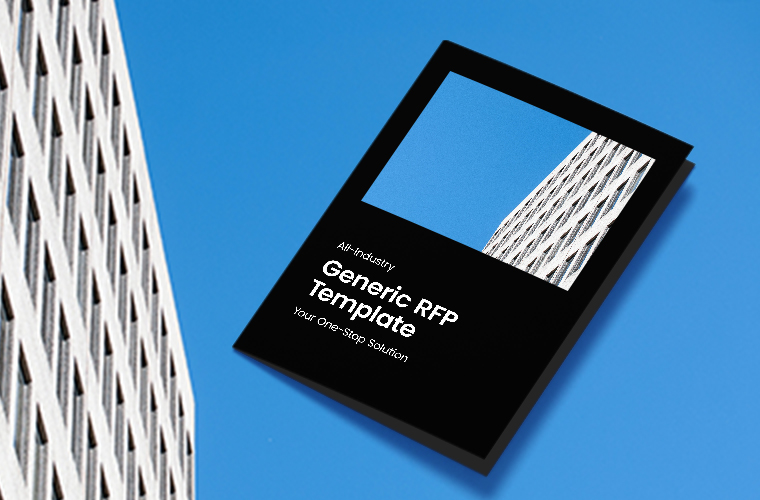
RFP Scoring Template
Unlock better decision-making with our RFP scoring template. Streamline evaluations, compare vendors effectively, and ensure you select the best fit every time. Optimize your procurement process today

Navigating the digital marketing landscape can be complex, especially with the fast-paced changes in technologies and consumer behavior. To stay competitive, businesses often turn to advertising agencies to manage their marketing strategies. But how do you pick the right advertising agency? This ultimate guide will walk you through the essential steps to finding the perfect agency partner for your business.
At the heart of every successful marketing strategy lies a clear vision and well-defined objectives. Before you embark on the journey of selecting an advertising agency, it’s critical to understand your bigger marketing picture. What is your overarching marketing vision? Are you looking to penetrate new markets, launch a new product, or perhaps strengthen your brand’s positioning?
Next, clarify the specific marketing objectives that align with this vision. These could include increasing brand awareness, boosting website traffic, driving customer engagement, or growing your customer base. These objectives should be Specific, Measurable, Achievable, Relevant, and Time-bound (SMART) to provide a clear direction and allow for performance measurement.
With your marketing vision and objectives in place, it’s crucial to understand how advertising fits into your overall marketing strategy. Advertising is a powerful tool that can help amplify your message, reach your target audience more effectively, and drive desired actions. It can boost brand visibility, stimulate interest, and ultimately, convert prospects into customers.
When done right, advertising complements your other marketing efforts such as content marketing, SEO, and social media marketing, creating a cohesive, integrated marketing strategy that drives substantial ROI. By understanding this interplay, you can effectively communicate your needs to prospective advertising agencies and ensure that the advertising strategy they propose aligns well with your overall marketing vision and objectives.
Advertising agencies offer a wide array of services – from SEO, PPC, social media marketing, content marketing, to web design, and more. Identify the specific services you need. You may want an agency that specializes in Google Ads or a full-service agency that can handle all aspects of your digital marketing.
Traditional Advertising Services: Despite the rise of digital, traditional forms of advertising such as TV, radio, print, and outdoor billboards remain effective, especially for certain industries and markets. If your marketing strategy includes these channels, you’ll want an agency experienced in creating compelling ads for these mediums.
Digital Advertising Services: This encompasses services like Google Ads, social media advertising (Facebook, Instagram, LinkedIn, etc.), display advertising, and programmatic advertising. If your target audience spends a lot of time online, an agency with digital advertising expertise could be a critical partner.
Search Engine Optimization (SEO): SEO enhances your website’s visibility on search engines, making it easier for potential customers to find you. Some agencies specialize in SEO, offering services like keyword research, on-page optimization, link building, and more.
Content Marketing: Content marketing involves creating and sharing valuable content to attract and engage your target audience. If this is a priority for you, look for agencies that offer content strategy development, content creation, and content promotion services.
Social Media Marketing: This involves managing your presence on social media platforms to engage with your audience and promote your brand. Some agencies offer full social media management, including strategy development, content creation, community management, and social media advertising.
Web Design and Development: If you need a new website or want to revamp your existing one, some agencies provide web design and development services. They can ensure your website is user-friendly, visually appealing, and optimized for search engines.
Analytics and Reporting: Any marketing effort should be backed by solid data. Look for an agency that offers analytics and reporting services. They should be able to track your campaigns, interpret the data, and provide actionable insights to improve your marketing efforts.
Setting your budget beforehand will further refine your search. Agency pricing varies considerably, and knowing what you’re willing to invest will help in selecting an agency that fits within your budget. You should factor in a variety of costs including:
Remember, the most expensive agency isn’t always the best, and vice versa. The goal is to find an agency that provides excellent value for your investment.
When you’re ready to start researching potential agencies, outside of the obvious methods of Googling or asking connections, using platforms like Slack and LinkedIn can be incredibly beneficial in gathering information and shortlisting suitable agencies.
Using Slack for Research: Slack isn’t just a tool for internal team communication. Numerous communities exist on Slack dedicated to various aspects of digital marketing and advertising. Joining these communities can help you gain valuable insights from other professionals. You can ask for agency recommendations, inquire about experiences with specific agencies, or seek advice on what to look for in an agency. The responses can give you first-hand knowledge and guide you towards agencies worth considering.
Leveraging LinkedIn Connections: LinkedIn is a goldmine of professional connections and industry knowledge. Utilize your network by posting a status asking for advertising agency recommendations. You can also directly message connections who might have recently worked with an agency or have relevant experience. LinkedIn also allows you to view and follow agency pages, where you can check their updates, client testimonials, case studies, and team expertise.
Moreover, LinkedIn is a great tool for assessing the professional background of the agency’s team. Look at their experience, endorsements, and how they engage with content in their field. This could give you an insight into their expertise and credibility.
The research phase is crucial in narrowing down your options to a shortlist of potential agencies. By using platforms like Slack and LinkedIn, you can leverage collective knowledge and personal connections, enabling you to make an informed decision. Always remember that the most suitable agency for your business isn’t just one that can deliver results, but one that aligns with your business vision, understands your industry, and can work as an extension of your team.
Cultural fit is an often-overlooked factor when choosing an advertising agency. An agency that shares your values and work ethic can make for a smoother, more productive relationship. Compatibility also extends to communication style. An agency that communicates effectively, listens to your needs, and keeps you updated about your campaign’s progress is invaluable.
Once you have a shortlist, it’s time to request proposals. These should be tailored to your business and provide a detailed strategy for achieving your goals. The proposal should also break down the cost for each service, ensuring transparency. It’s equally important to meet the team that will be working on your account. They should be enthusiastic, knowledgeable, and show a deep understanding of your industry.
Success stories and client references are incredibly valuable tools when selecting an advertising agency. They provide a glimpse into the agency’s performance and how they handle real projects. Here’s how to effectively review success stories and check references:
Analyzing Success Stories and Case Studies: Agencies often showcase their best work on their websites in the form of success stories or case studies. When reviewing these, look beyond the aesthetics and delve into the details. How did the agency tackle the client’s problem? What strategy did they employ? How did they measure success, and what were the results?
Pay particular attention to success stories similar to your business or industry. This can give you a good sense of the agency’s ability to understand and address your specific needs. Remember, a successful advertising campaign is not just about producing a creative ad; it’s about driving results that align with the client’s marketing objectives.
Checking References: Once you’ve shortlisted a few agencies based on their success stories, it’s time to check their references. An agency should be more than willing to provide references for you to speak with. When contacting these references, ask specific questions such as:
This first-hand feedback can provide invaluable insights into the agency’s work ethic, professionalism, and ability to deliver results.
While past performance doesn’t guarantee future results, success stories and references can provide you with a better understanding of what an agency is capable of, helping you make an informed decision. Always remember, the right agency for your business should have a proven track record of delivering measurable results for their clients.
Finding the right advertising agency can be a pivotal step towards achieving your business goals. However, the selection process can be complex and time-consuming. This is where an Advertising Agency Request for Proposal (RFP) can come in handy.
An RFP is a document that outlines your business needs, goals, and expectations. It provides a structured framework for agencies to understand your requirements and respond with a customized proposal that aligns with your specific objectives. This allows you to compare agencies in a consistent, structured way, which can streamline your decision-making process.
Furthermore, an RFP helps ensure that the agencies you consider are serious about their commitment to your project. If an agency is unwilling or unable to respond to your RFP in a detailed, thoughtful manner, it’s a clear indication that they might not be the right fit.
Lastly, an RFP can save you time in the long run. By detailing your expectations and requirements upfront, you can avoid misunderstandings later, ensuring that the agency you choose is well-equipped to meet your needs.
The goal of the selection process is to find an agency that can deliver results and create a successful partnership with your business. By using an RFP as part of your approach, you can ensure a more targeted, effective search and ultimately make a well-informed decision in choosing your ideal advertising agency.

Unlock better decision-making with our RFP scoring template. Streamline evaluations, compare vendors effectively, and ensure you select the best fit every time. Optimize your procurement process today

Covering a broad range of industries and scenarios, this Generic RFP template aids in detailing project requirements, establishing evaluation criteria, and soliciting comprehensive vendor proposals.

Designed to demystify complexities, this RFP Process Guide provides step-by-step instructions and best practices for crafting effective RFPS.